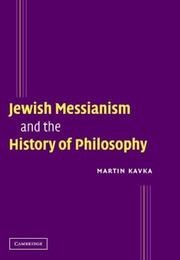| Listing 1 - 1 of 1 |
Sort by
|

ISBN: 0521831032 0511193882 9780511193880 9780521831031 051119594X 9780511195945 0511195281 9780511195280 9780521104630 0521104637 1280477865 9781280477867 0511314302 9780511314308 0511499094 9780511499098 0511194625 9780511194627 1107148383 0511193181 9781107148383 9780511193187 Year: 2004 Publisher: Cambridge Cambridge University press
Abstract | Keywords | Export | Availability | Bookmark
 Loading...
Loading...Choose an application
- Reference Manager
- EndNote
- RefWorks (Direct export to RefWorks)
Jewish Messianism and the History of Philosophy contests the ancient opposition between Athens and Jerusalem by retrieving the concept of meontology - the doctrine of nonbeing - from the Jewish philosophical and theological tradition. For Emmanuel Levinas, as well as for Franz Rosenzweig, Hermann Cohen and Moses Maimonides, the Greek concept of nonbeing (understood as both lack and possibility) clarifies the meaning of Jewish life. These thinkers of 'Jerusalem' use 'Athens' for Jewish ends, justifying Jewish anticipation of a future messianic era as well as portraying the subjects intellectual and ethical acts as central in accomplishing redemption. This book envisions Jewish thought as an expression of the intimate relationship between Athens and Jerusalem. It also offers new readings of important figures in contemporary Continental philosophy, critiquing previous arguments about the role of lived religion in the thought of Jacques Derrida, the role of Plato in the thought of Emmanuel Levinas and the centrality of ethics in the thought of Franz Rosenzweig.
Jewish philosophy --- Messiah --- Nonbeing --- Philosophy --- Non-being --- Nothing (Philosophy) --- Ontology --- Judaism --- History --- Religious aspects&delete& --- Doctrines --- Lévinas, Emmanuel. --- Lévinas, Emmanuel --- Nonbeing. --- Judaism. --- Religious aspects --- History. --- Lévinas, Emmanuel --- Views on nonbeing. --- Lévinas, Emmanuel. --- Arts and Humanities --- Religion --- Levinas, Emmanuel
| Listing 1 - 1 of 1 |
Sort by
|

 Search
Search Feedback
Feedback About UniCat
About UniCat  Help
Help News
News